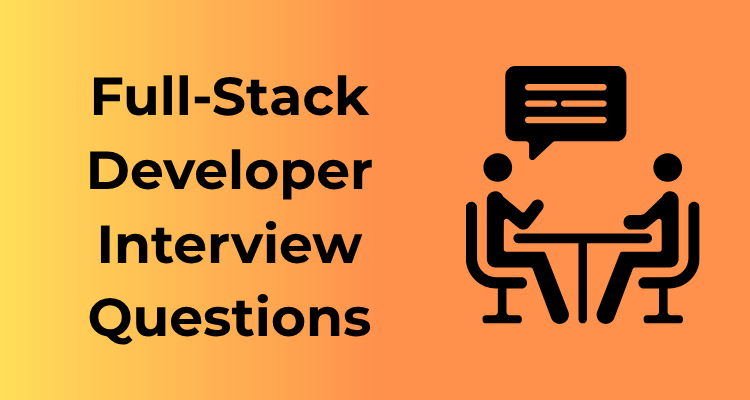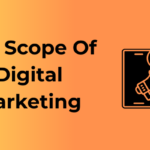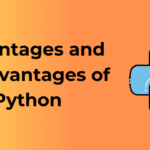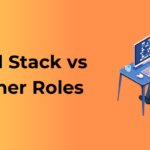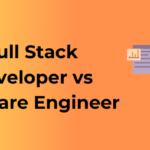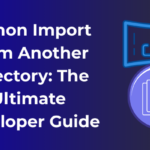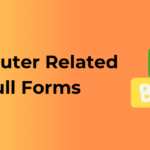Full-stack developers are some of the most in-demand professionals, and for good reason. They bridge the gap between design, logic, and data, ensuring that web applications run smoothly from end to end.
But when it comes to hiring or interviewing a full-stack developer, what should you really look for? From front-end proficiency and back-end logic to database management and API integration, this guide breaks down the essential areas to focus on during interviews to help you identify truly skilled candidates.
Understanding Front-End Proficiency: Not Just About Pretty Interfaces
Let’s talk about one of the crucial aspects of being a full-stack developer, front-end proficiency. It’s easy to get caught up in the idea that the front-end is all about making things look aesthetically pleasing, but oh, it’s so much more than that!
The front-end is essentially the bridge between the user and a complex system, and this bridge must be both functional and delightful to use.
Beyond the Surface: What Does Front-End Proficiency Really Mean?
A competent full-stack developer doesn’t just “dabble” in front-end technologies—they possess a thorough understanding of the principles that make a UI effective. At its core, this includes:
- Mastering Core Technologies: HTML, CSS, and JavaScript are the bread and butter of front-end development. Solid expertise in these is non-negotiable. Can the candidate code a responsive layout without resorting to endless stack-overflow searches?
- Framework Familiarity: Whether it’s React, Angular, or Vue.js, understanding at least one popular front-end framework is a key indicator of someone’s ability to keep up with industry standards.
- Thinking Mobile-First: With the majority of internet users browsing on mobile devices, being skilled in creating responsive and adaptive designs is crucial. Concepts like media queries and flexible grids should roll off their tongue.
- Accessible and Inclusive Design: Truly great interfaces are accessible to everyone. Does the developer understand ARIA roles or techniques to optimize for screen readers? This often-overlooked skill is a game-changer!
The “User Experience” Litmus Test
Front-end isn’t just about writing functional code, it’s about understanding the human side of software. A significant part of a developer’s role is to create an engaging experience.
Here are some ways to assess their thought process:
- Ask how they debug a clunky interaction. This can reveal their problem-solving approach and how well they understand the user journey.
- Pose a real-world scenario: How would they structure a form for an e-commerce checkout? A great answer will balance simplicity, usability, and accessibility.
- Request to see side projects. Have they built UIs that demonstrate an eye for detail? Thoughtful, polished designs speak volumes.
Just “Pretty” Isn’t Enough
Here’s the truth: anyone can make a nice-looking website using a pre-built theme or a CSS framework like Bootstrap. But a full-stack developer should show that they’re capable of building functional, seamless, and efficient user interfaces, not just slapping a cute font on a button.
For instance, do they know how to use JavaScript (or even better, TypeScript!) to dynamically update content without refreshing the page? How do they handle browser compatibility issues? What trade-offs do they consider when choosing between page performance and visual fidelity?
Back-End Fundamentals: Evaluating Logic and Systems Knowledge
Now, let’s dive into the world of back-end development! If you’re vetting a full-stack developer, their understanding of back-end fundamentals is non-negotiable.
This is where the gears of any application turn – the unseen but vital foundation that keeps everything running smoothly. So, what should you focus on during an interview to assess a candidate’s back-end prowess? Let’s break it down step by step.
Understand Their Grasp of Server-Side Programming
The back-end is all about logic and functionality. Begin by probing the candidate’s knowledge of server-side programming languages. Popular ones today include:
- JavaScript/Node.js: Highly versatile and common in full-stack development.
- Python: Known for its readability and extensive library support.
- Ruby: Preferred for rapid development with frameworks like Ruby on Rails.
- Java: A long-standing favorite for enterprise applications.
A competent full-stack developer should not only have proficiency in at least one of these languages but also understand how to structure scalable, maintainable code on the server-side. Ask questions such as:
- How would you design a RESTful endpoint?
- Can you explain middleware in the context of Node.js?
These queries assess their ability to create reliable and functional server-side support for applications.
Delving Into Database Interaction
Back-end knowledge isn’t complete without strong systems knowledge, especially when it comes to connecting servers with databases. Understanding database logic is crucial. While we’ll cover database handling in-depth further on, a quick check here is helpful. Some basics include:
- How to retrieve, store, and update data efficiently.
- Knowledge of relational (e.g., MySQL, PostgreSQL) and non-relational databases (e.g., MongoDB).
- Crafting queries that optimize performance without overloading servers.
Your questions might look something like: “Can you explain the difference between an SQL JOIN operation and MongoDB’s aggregation pipeline?” This not only clarifies their understanding but also tests their ability to switch between technologies when appropriate.
Assessing System Architecture and Scalability Knowledge
When apps grow, their infrastructure must keep pace. Ask candidates about their experience with designing scalable systems. Here, you’re trying to gauge their understanding of:
- Load balancing
- Distributed systems
- Caching mechanisms (e.g., Redis, Memcached)
Scenario-based questions like “How would you optimize a website with high traffic to prevent server crashes?” can provide great insight into their logical thinking and problem-solving approach.
Understanding Security Measures
Of course, no back-end role is complete without discussing security. After all, the back-end is where sensitive user data is stored and operations are performed. Ask about their approach to:
- Preventing SQL injection and cross-site scripting (XSS)
- Implementing authentication systems (e.g., OAuth, JWTs)
- Encrypting sensitive data effectively
An excellent follow-up question could be: “In your experience, what has been the most challenging back-end security issue you’ve tackled, and how did you solve it?”
Database Handling: Beyond Basic Queries
Alright, let’s roll up our sleeves and dive into one of the spine-chillingly important aspects of full-stack development – database handling.
Now, I know what you’re thinking: databases? Isn’t that just about running a few SQL queries and calling it a day? Absolutely not. Database handling goes miles beyond basic queries. Let me paint this picture for you.
Why Database Mastery Matters
Imagine this – you’re building the next big e-commerce application. Every single product detail, transaction, customer account, and even their wishlists live securely in a database. Managing databases effectively is crucial to maintaining data integrity, scalability, and performance. Poor database handling could mean slower application responses, corrupted data, or even security risks. That’s the stuff you want to steer clear of, right?
Key Areas To Assess in a Candidate
When interviewing for a full-stack developer, evaluating their database skills requires going beyond the basics. A rock-solid candidate should show competence in several important aspects. Here’s what to focus on:
- Database Design: Can they create a normalized database schema? Do they understand the importance of avoiding database redundancy while maintaining meaningful relationships between tables?
- Query Optimization: Writing basic SQL is one thing, but optimizing queries to keep your app running like butter smooth is the real deal. Can they use indexing properly? Can they pinpoint bottlenecks in a query?
- NoSQL Knowledge: In today’s landscape, reliance solely on relational databases isn’t always enough. See if the candidate is familiar with NoSQL databases like MongoDB or DynamoDB – particularly useful in handling unstructured or scalable data.
- Data Security: Ask about their practices to secure sensitive information. Encryption, secure backups, and access permissions are not negotiable in modern applications.
- Understanding ACID Transactions: Atomicity, Consistency, Isolation, Durability – it’s a mouthful, but these principles are the bedrock of reliable operations in transactional systems. Does the candidate know how to apply them?
Questions That Can Spark Insightful Discussions

To uncover their database handling experience, try posing thoughtful, scenario-based questions. A few examples:
- “Describe a project where you designed a database schema. How did you determine the relationships between different entities?”
- “What steps would you take to optimize a query that takes too long to execute?”
- “What factors would lead you to choose a NoSQL database over a relational database?”
- “How would you ensure sensitive data such as user passwords are stored securely in your database?”
- “Explain a situation where you faced a database bottleneck. What was the issue, and how did you fix it?”
Hear their responses and watch out for thoughtful explanations backed by real-world experience. The goal here is not just to test their technical know-how, but also their ability to think critically and approach database management with care and strategy.
Pro Tip: Look for Versatility
A great database handler isn’t just technically sound; they adapt to the unique requirements of each project. Some projects demand a blazing-fast NoSQL setup for massive user loads, while others thrive best using highly structured relational databases. A clear grasp of both worlds is a big green flag!
API Creation and Integration: Testing Real-World Application Knowledge
If you’re aiming to assess someone’s full-stack developer chops, focusing on API creation and integration is non-negotiable. APIs (Application Programming Interfaces) are the bridges that allow different systems, applications, and services to communicate. It’s the glue holding together modern, connected web applications we rely on daily. So, let’s break down why this is such a crucial area and how you can evaluate a developer’s expertise.
Why APIs Matter So Much
APIs aren’t just for communication; they define the efficiency, scalability, and extendability of any application. From fetching weather data to enabling secure payment processing, APIs expand application capabilities, often without developers reinventing the wheel.
Full-stack developers should not only know how to create robust APIs but also understand how to consume and integrate third-party APIs. This ensures seamless connectivity between various platforms and systems. That’s a rare, real-world skill that differentiates a good developer from a great one.
What to Look for in API Creation
When it comes to API development, here’s a set of skills your candidate should demonstrate:
- RESTful Principles: They should be conversant with REST (Representational State Transfer) standards, structuring their APIs in a logical, client-friendly way.
- Authentication and Security: They should know how to handle API keys, OAuth2, tokens, or JWT to safeguard data and user privacy.
- Error Handling: Are error messages clear and informative? Candidates should showcase careful thought in defining status codes (404s, 500s, etc.) and messages.
- Scalability: Can their API solution handle growth? Ask about rate limiting, caching, and horizontal scaling strategies.
Try asking the candidate to design a basic API for a common app feature, such as signing up for a newsletter or fetching a user’s profile. This can give insights into their thought process and coding structure.
The Integration Side of the Coin
APIs don’t always have to be built from scratch—enter the world of third-party API integration. A good full-stack developer should know how to work with everything from social media logins to payment gateways like Stripe or PayPal, and even cloud storage APIs like AWS S3 or Google Drive.
Here’s what to evaluate in integration:
- Documentation Skills: Can they understand and interpret API documentation quickly? Mastering this skill is a non-negotiable in projects where APIs are heavily referenced.
- Handling Data: Are they adept at reformatting, validating, or transforming the data fetched from APIs to fit their own system?
- Error Management: Do they set up fallback mechanisms if an API doesn’t respond or behaves unexpectedly?
For a practical, hands-on assessment, ask them to implement a small real-world feature. For example, integrate a weather API to fetch and display current weather updates for a given location. Watching them debug CORS (Cross-Origin Resource Sharing) issues or handle rate limits will tell you a lot about their practical proficiency.
Best Practices: Setting Candidates Up for Success
Remember, good developers aim for simplicity without cutting corners. Here are some bonus points to watch for during your evaluation:
- Do they use tools like Postman or Insomnia to test their APIs?
- Are they aware of GraphQL as an API alternative to REST?
- How familiar are they with monitoring tools (e.g., API Gateway dashboards) to ensure uptime and performance?
API-related questions assess more than just technical prowess—they’re a peek into how well candidates solve real-world issues. Spotting a developer capable of owning API creation and integration could mean finding someone who’ll help your teams ship faster, secure better outcomes for users, and navigate complex systems without breaking a sweat. Bonus: It’ll save you from midnight troubleshooting calls!
Debugging and Problem Solving: How to Spot Real Talent

Debugging and problem-solving might just be *the* cornerstone of a great developer’s skillset. If you’re on the hunt for a full-stack developer, evaluating their ability to identify, dissect, and resolve issues is critical. But let’s unpack this further, debugging isn’t only about squashing bugs; it’s about *thought process, creativity, and patience*.
Why Debugging is More Than Just Fixing Code
A skilled developer isn’t one who writes perfect code all the time (spoiler: it doesn’t exist), but one who can troubleshoot and untangle problems quickly and efficiently. Debugging showcases:
- Critical Thinking: How does the candidate break down a complex problem?
- Attention to Detail: Bugs can hide in the most inconspicuous places.
- Resourcefulness: Is the candidate leveraging tools, documentation, or even asking peers effectively?
- Resilience: Staring at hours of misplaced semicolons requires grit!
Crafting Insightful Debugging Challenges
Testing for debugging talent during an interview doesn’t mean tossing a messy ball of spaghetti code their way and expecting brilliance. The challenge should be thoughtful and focus on their process. Here are some tips to design such tasks:
- Present a Realistic Scenario: Offer a sample app or script with intentional, logical errors that simulate real-world issues.
- For example: “A form isn’t submitting properly, and there’s no error message.”
- Focus on Their Approach: Ask the candidate to *think aloud*. How do they identify the problem? Are they systematically isolating the bug?
- Test Comprehensive Skills: Include issues like performance bottlenecks or subtle UX glitches—not just syntax problems.
- Gauge Tool Proficiency: Tools like browser developer tools, debugging consoles, or IDE utilities are staples for today’s developers. Do they demonstrate comfort with these?
Spotting True Debugging Talent
So how do you separate the pros from the “meh”? Look for developers who:
- Form Strong Hypotheses: They don’t blindly jump to conclusions but rather follow a logical approach to deduce what *could* be wrong.
- Communicate Clearly: Debugging is rarely done in a vacuum. Developers often need to explain the issue to teammates or stakeholders.
- Learn from Mistakes: Do they recognize patterns in their errors and explain how they’d avoid them in the future?
- Stay Cool Under Pressure: Debugging can be frustrating. A calm, analytical demeanor is a huge plus.
Common Interview Questions for Debugging Talent
Here are some questions you might consider asking to assess a candidate’s debugging prowess:
- How do you prioritize when faced with several bugs at once?
- Can you walk us through a specific debugging challenge you’ve faced? What was the problem, how did you approach it, and what was the final resolution?
- How do you utilize debugging tools? Do you have any personal tips or tricks that have worked well?
Why It All Matters
Debugging and problem-solving reveal how a developer thinks when things don’t go according to plan. And let’s be honest, in development, that’s a lot of the time. A candidate’s ability to tackle unforeseen challenges and learn from them is a massive indicator of their potential as a well-rounded full-stack developer.
Practical Workflows: Team Collaboration and Code Management
Alright, let’s dive into something that often gets overlooked but is absolutely pivotal for any developer: practical workflows. Sure, you can code up amazing features solo, but this is the real world, where teamwork and streamlined processes lead to success. Whether you’re prepping for a job interview or building your expertise, understanding collaborative workflows and proper code management is key.
Why Practical Workflows Matter
At its core, development isn’t just about writing lines of code—it’s about ensuring that your code works seamlessly with your teammates’ contributions. Companies today thrive on agile methodologies, collaborative tools, and smart management of the codebase. So, in an interview for a full-stack developer role, you’re very likely to be asked questions about how you handle these workflows.
Key Topics to Prepare For
When it comes to practical workflows, focus on the following:
- Version Control: Proficiency with Git is non-negotiable. Be sure you can discuss branching strategies (e.g., Gitflow, trunk-based development) and know how to manage pull requests. For instance, can you explain how to resolve merge conflicts or why you’d opt for a feature branch workflow over directly committing to the main branch? These are hot topics in interviews.
- Working in Agile/Scrum Environments: Recruiters will often ask if you’ve worked in teams using Agile or Scrum. If you have, mention using tools like Jira, Trello, or Asana to manage sprints or task assignments. Knowing how the sprint-to-deployment cycle works demonstrates your grasp of the bigger picture.
- Code Review Etiquette: When working as part of a team, giving and receiving constructive code reviews is a must. Interviewers may ask, “How would you approach a colleague’s code that works but doesn’t follow best practices?” Pro tip: Highlight that you aim for collaboration, not criticism, during reviews.
- CI/CD Pipelines: Continuous Integration and Continuous Deployment/Delivery (CI/CD) is foundational these days to ship quality code faster. Discuss your experience with tools like Jenkins, GitHub Actions, or GitLab CI, and the importance of automated testing as part of the pipeline. If you’ve helped implement or improve CI/CD pipelines in a team, bring that up—it’s an ace card!
Common Interview Questions To Expect
Wondering what kind of questions test your workflow knowledge? Here are some examples:
- “How do you handle conflicts in a Git repository when working with a team?”
- “Describe your approach to a code review process. How do you ensure it’s constructive?”
- “What tools do you use for project management and how do they aid collaboration?”
Showcasing Your Skills in Interviews
If these workflows sound familiar, great! But simply knowing them isn’t enough—you need to demonstrate them. For example, when you’re asked about Git, talk about a scenario where you had to resolve a tricky conflict. Or maybe you’ve used retrospectives in Agile to improve your team’s productivity—share that story.
Workflows Are More Than Tools
Lastly, remember this: workflows aren’t *just* about the tools—they’re about the mindset. Hiring managers want full-stack developers who communicate effectively, collaborate like team players, and ensure the codebase stays robust and clean. Show that you’re not just a lone coder but someone who thrives in an ecosystem of diverse talents working towards shared goals.
Latest Tools and Technology Trends: Gauge Adaptability to Stay Updated
Ah, technology – the ever-changing beast of the modern world! One moment you’re confidently using your favorite tools, and the next, there’s a shiny new framework or platform that “everyone” is talking about. For Full-Stack Developers, staying current with the latest tools and trends isn’t just a nice-to-have skill — it’s crucial. So, why not embrace this dynamic world with open arms? Here are some key reasons why hiring managers focus on this area, along with tips and strategies for navigating the tech landscape effectively.
Keeping Up Shows Adaptability
In the tech industry, things move fast. If you’re interviewing for a Full-Stack Developer role, you can expect questions about your familiarity with the latest tools. Why? Because adaptability to change is a hallmark of a great developer. Being able to learn and adopt new technologies quickly isn’t just about being trendy; it’s vital for delivering fresh, scalable, and efficient solutions.
If React or Angular were the rising stars a few years ago, now developers are exploring frameworks like Svelte. Kubernetes became essential for managing containers, and have you dabbled in edge computing yet? Staying updated demonstrates your versatility and eagerness to stay ahead, and it’s always a green flag for employers.
How to Gauge Adaptability in Full-Stack Developers
For interviewers, here’s some friendly advice: it’s not necessary to grill candidates on their knowledge of every single new technology. Instead, ask open-ended questions to assess their ability to learn and their attitude towards emerging trends. Consider questions like:
- What new tool or technology have you recently explored, and how did you apply it?
- How do you stay updated on changes in the tech space?
- Can you share an experience where adopting a new tool greatly improved your workflow?
Answers to these questions can reveal their enthusiasm for learning and their proactive nature when it comes to staying on top of trends.
Why Staying Updated Matters for Employers
Companies want employees who are prepared for tomorrow’s challenges, not just today’s tasks. The tech stack your company relies on might change or evolve, and your ideal Full-Stack Developer should be someone who views this as an exciting challenge, rather than a daunting hurdle. Beyond technical skills, keeping pace with trends reflects a growth-oriented mindset — a trait every team benefits from.
Practical Ways Developers Can Stay Current
For developers, keeping pace with the ever-evolving landscape can seem overwhelming, but it doesn’t have to be! Here are a few actionable tips:
- Engage with developer communities: Join forums, attend meetups, or participate in open-source projects. Platforms like GitHub, Stack Overflow, and Reddit are treasure troves of knowledge.
- Follow industry news: Sites like TechCrunch, Smashing Magazine, and Dev.to often write about emerging tools and trends. Subscribing to newsletters or blogs can help you stay informed without sifting endlessly through the internet.
- Try hands-on experimentation: If you hear about a new tool, take it for a spin! Create a small project or play around with tutorials. There’s no better teacher than actual experience.
- Enroll in courses: Platforms like Udemy, Coursera, and Pluralsight offer courses constantly updated with the latest tech practices.

